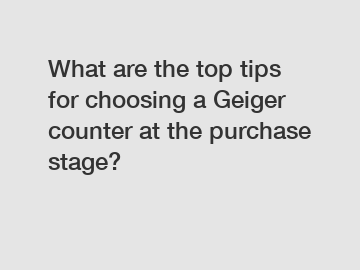What are the top tips for choosing a Geiger counter at the purchase stage?
Nuclear & Electronics Product Page
What are the top tips for choosing a Geiger counter at the purchase stage?
When it comes to choosing a Geiger counter, there are a few key factors to consider to ensure you are getting the right device for your needs. Here are some top tips to keep in mind when making your decision:

1. Determine your budget: Geiger counters can range in price from a few hundred dollars to several thousand dollars. It's essential to have a clear idea of how much you are willing to spend before you start shopping. Consider what features are essential to you and what you can do without to stay within your budget.
2. Consider your level of experience: Are you a beginner who needs a straightforward device, or are you an experienced user looking for more advanced features? Some Geiger counters are designed for professionals who require precise measurements, while others are more user-friendly for beginners. Make sure to choose a device that matches your level of experience.
3. Think about the types of radiation you will be measuring: Different Geiger counters are designed to detect various types of radiation, such as alpha, beta, gamma, and x-rays. If you have a specific type of radiation you need to measure, make sure the Geiger counter you choose is capable of detecting it. Some devices are more versatile and can measure multiple types of radiation.
4. Consider the sensitivity of the Geiger counter: The sensitivity of a Geiger counter refers to how well it can detect low levels of radiation. If you are working with radioactive materials that emit low levels of radiation, you will need a highly sensitive device. On the other hand, if you are using the Geiger counter for general radiation detection, a less sensitive device may suffice.
5. Look for additional features: Some Geiger counters come with extra features that can make your life easier, such as data logging, computer connectivity, and alarms. Think about whether these features are important to you and if they are worth the extra cost. Keep in mind that additional features can also make the device more complicated to use, so consider your comfort level with technology.
6. Read reviews: Before making a purchase, take the time to read reviews from other users to get an idea of the reliability and accuracy of the Geiger counter you are considering. Look for feedback on the device's performance, ease of use, and durability. Reading reviews can help you make an informed decision and avoid any potential pitfalls.
In conclusion, choosing a Geiger counter is an important decision that requires careful consideration of your needs, budget, and level of experience. By following these top tips, you can feel confident in selecting a device that meets your requirements and provides accurate radiation measurements. Remember to do your research, compare different options, and read reviews to ensure you are making the best choice for your situation. What are the top tips for choosing a Geiger counter at the purchase stage? Choose wisely and stay safe in your radiation detection endeavors.
You can find more information on our web, so please take a look.
If you want to learn more, please visit our website master oscillator power amplifier.



